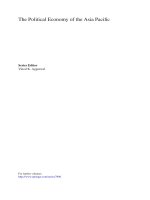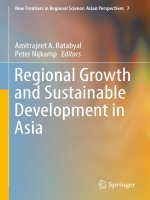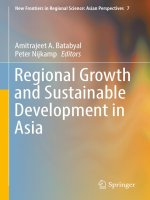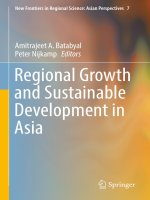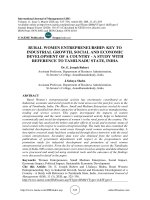Economic growth and economic development 39
Bạn đang xem bản rút gọn của tài liệu. Xem và tải ngay bản đầy đủ của tài liệu tại đây (44.73 KB, 1 trang )
.06
Introduction to Modern Economic Growth
KOR
HKG
average growth gdp per capita 1960-2000
-.02
0
.02
.04
THA
CHN
IRL
BRB
PRT
COG
IDN
ESP
GRC
PAK
NPL
MLI
ITA
DOM
BRA
INDSYR
EGY
TUR
IRN
ZWE
MWI
DZA
UGAGTM
GHA
BGD KEN
GMB
CMR
BEN
BDI
TGO
RWA
SEN
LKA
LSO
COL MEX
PRY
ECU
JOR
CRI
SLV
HND
JPN
MUS MYS
ZAF
PER
JAM
ISL
FRA
AUT
FIN ISR NOR
BEL
NLD
CHL
TTO
PAN
GBR
CAN
DNK AUS
SWE
USA
CHE
PHL
URY
NZL
ARG
BOL
VEN
ZMB
MOZ
NIC
NER
0
2
4
6
average schooling 1960-2000
8
10
Figure 1.17
least in part, by omitted factors affecting both investment and schooling on the one
hand and economic growth on the other.
We will investigate the role of physical and human capital in economic growth
further in Chapter 3. One of the major points that will emerge from our analysis
there is that focusing only on physical and human capital is not sufficient. Both
to understand the process of sustained economic growth and to account for large
cross-country differences in income, we also need to understand why societies differ
in the efficiency with which they use their physical and human capital. We normally
use the shorthand expression “technology” to capture factors other than physical
and human capital affecting economic growth and performance (and we will do so
throughout the book). It is therefore important to remember that technology differences across countries include both genuine differences in the techniques and in
25



